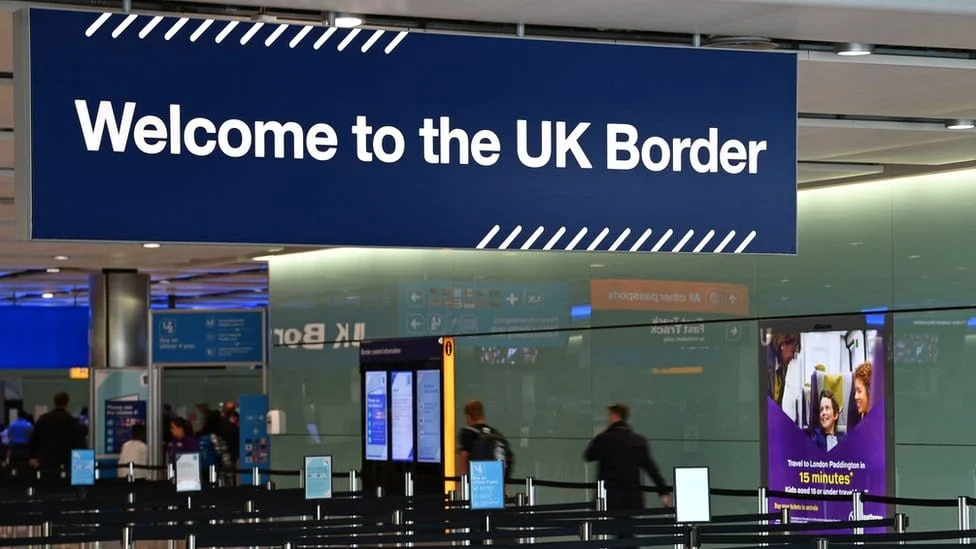Claiming Asylum in the UK
Claiming asylum in the UK is a complex legal process. There are eligibility criteria for who can apply for asylum. You must be eligible and you must attend at least one interview with a Home Office immigration official who will assess your case.
Call us on +44 (0)333 414 9244 for immediate help & assistance with your situation. We’re here to help you in person, via the phone or online.
Read our 1001 reviews
Request a call back from our immigration experts
Benefits of Choosing IAS for your Asylum Claim
Obtaining asylum in the UK can be a stressful process. However, IAS’s experienced and reliable immigration lawyers can help you and be your source of support every step of the way.
When getting in touch with us for help with your UK asylum claim, you will:

Receive full, hands-on support from a qualified asylum lawyer to assist with your case.



Be fully briefed on the intricacies of the UK asylum system and what you can do to successfully claim asylum.



Benefit from expert legal representation to fight for your case on your behalf.



Continue to receive support from your lawyer in the event of any complications or refusals.
Services we Provide
What is Claiming Asylum?
The right to claim asylum in another country is one that was established by the United Nations Refugee Convention in 1951. 146 countries agreed to this convention and are bound to its regulations under international law. In the UK, a person has the legal right to claim asylum if they cannot return to their home country for fear of persecution.
There are eligibility criteria attached in order to make a successful claim for asylum. The asylum claim process can be lengthy. Following arrival in the UK, an initial asylum application must be made. This should be made on the basis of having left one’s country with the inability to return due to the threat of persecution which has endangered the person’s life.
Following the initial application for asylum at a border port or airport, a meeting with an immigration officer will be held. This is commonly referred to as ‘screening.’ These meetings are held in-person and you are required to bring any relevant documents with you on behalf of your case.
The Home Office will then make a decision on whether your asylum claim can be submitted. If you receive confirmation that you can make a claim, you will subsequently be required to attend a substantive asylum interview with a caseworker.
This interview is your opportunity to explain the reasons why you are claiming asylum. You are entitled to bring an immigration lawyer or solicitor with you to this meeting.
You will receive a decision on your application within approximately 6 months from the date of this appointment. In the meantime, you will likely not be allowed to work while your claim is being processed. Under certain circumstances, you may be detained while you are waiting. If your application is unsuccessful, you may have the right to appeal.
Immigration Advice Service offers legal guidance to people claiming asylum or seeking a refugee visa UK. If you are in an emergency situation, contact us today for support with your claim. Asylum law is complex and it is recommended to use the services of a specialist immigration lawyer to assist with your claim.
Suspension of Asylum Differentiation Policy
The Nationality and Borders Act 2022 introduced two groups of refugees in the UK: Group 1 and Group 2. Group 1 refugees are granted permission to stay for five years and can apply for settlement, while Group 2 refugees are given temporary permission to stay for 30 months on a 10-year route to settlement. This differentiation aimed to discourage illegal migration.
To further deter illegal entry, the government introduced the Illegal Migration Bill, which makes asylum claims inadmissible for those who arrive illegally through safe countries, and imposes a duty to remove them. As a result of these changes, the differentiation policy will be paused in July 2023, and all successful asylum applicants will receive the same conditions regardless of their group.
Additionally, a streamlined asylum processing model was announced for certain nationalities with high asylum grant rates, including Afghanistan, Eritrea, Libya, Syria, Yemen, and Sudan. Positive decisions for well-founded cases in these nationalities can be made without an additional interview, and no asylum application will be refused without an opportunity for an interview. Sudanese legacy claimants are being processed in line with established policies, with a commitment to clear the backlog of legacy asylum claims by the end of 2023.
Transparency in Withdrawing Asylum Claims
The updated paragraph 333C clarifies the circumstances for withdrawing asylum claims and strengthens the process to promptly withdraw applications from non-compliant individuals. It specifies that withdrawn claims won’t be considered, allows flexibility for explicit withdrawals, and places the burden on claimants to keep the Home Office updated with their contact details. Failure to comply may lead to withdrawal of their asylum claim. These changes aim to focus decision-making resources on genuine asylum claimants in the UK. The changes to the Immigration Rules were implemented in July and August 2023:
- In July 2023, the changes regarding Asylum including the pause of the differentiation policy took effect.
- All remaining changes were enforced on 7 August 2023.
What does asylum-seeking mean?
The term ‘asylum seeker’ refers to a person who has left their home country due to persecution and is seeking refuge in another country. They are unable to return to their country of origin due to a credible danger to their life.
An asylum seeker has the right to request humanitarian protection in another country. If a person has received this protection or refugee status, they are entitled to specific rights as well as internationally-recognised rights.
In the UK, a person who has been granted refugee status can hold this for up to five years. They will be given the opportunity to extend their leave after this time.
If an asylum application is not accepted, this person has a refused asylum claim. Depending on the case, a person may be forcibly deported from the country or they may return to their country of origin independently.
In 2019, almost 80 million people worldwide were displaced from their homes. The UK hosts 1% of the world’s 29.6 million refugees.
What is the eligibility criteria for claiming asylum in the UK?
The primary eligibility criteria for claiming asylum in the UK according to the Home Office is that you must be unable to live safely in any part of your own country because you fear persecution there.
The UK government has outlined the categories that this persecution is based on:
- Race
- Religion
- Nationality
- Political opinion
- Gender, gender identity, sexual orientation or another factor that will result in persecution because of the social, political, or religious culture in your country
You must be able to show that you sought and were denied protection from officials in your own country. Further, the persecution must be caused by the authorities or a group of individuals sanctioned (implicitly or explicitly) by the authorities.
There are circumstances under which your asylum claim may be denied by the Home Office. If you are coming from another EU country or you have travelled through another country on the way to the UK, your claim may not be accepted. Additionally, your claim may be rejected if you have links to another safe third country where you could conceivably claim asylum.
A ‘safe third country’ is defined by the Home Office as a country that you’re not a citizen of, one where you would not be harmed, and one that would not send you to another country where you might be harmed.
How to claim asylum in the UK?
To claim asylum in the UK, you should contact border officials at any UK port and state that you wish to make an asylum claim. After this, you will be brought for a screening interview. If you are already living in the UK and want to claim asylum, you should contact the Home Office to book a screening interview.
You must have left your country of origin due to fear of persecution that falls under one of the protected classes under international law.
If the Home Office believes that your case is valid, you may be referred for a substantive interview. During this interview, you will be asked in-depth questions about your reasons for leaving your country of origin and the reasons you are seeking asylum in the UK.
Following this interview, you will be issued with a decision on your case. Under some circumstances, it is possible to appeal a negative decision.
If you are provided with a positive decision, you will be granted leave to remain under a specific immigration status.
How to Register an Asylum Claim in the UK?
It is important that you register your asylum claim as soon as you arrive in the UK in order to start the asylum application process. Failure to do this immediately on arrival at a UK border could result in a denied application. The Home Office may assert that you are not in danger of persecution if you do not make your claim on arrival.
If you arrive in the UK and notify Border Force officials that you wish to apply for asylum protection, you will be directed to your screening interview with an immigration officer.
During this time, officials will take a record of your photograph and fingerprints and discuss with you why you are claiming asylum.
If you are living in the UK and you become eligible to seek asylum, you should contact the asylum intake unit to schedule a screening interview with an immigration official.
This process will register your asylum claim and following this, your case will be taken under review by the Home Office. If successful, you will be invited to an asylum substantive interview.


What Are The Documents Required for Asylum or a Refugee Visa in UK?
There are a number of documents that you must provide if you are submitting an asylum claim in the UK. Each stage of the process requires different documents.
For the initial screening interview, you should provide:
- Passports or travel documents
- Police registration certificate
- Proof of identity documents (e.g., identity cards, birth certificates, marriage or divorce certificates, official school records)
- Any other relevant documents that may help your case
If you are already resident in the UK when making an asylum claim, you should be prepared to provide proof of address. This could include:
- Letter from a bank
- Housing benefit documents
- Council tax letter
- Lease or tenancy agreement
- Utility or household bill
- Alternatively, proof that you are staying with another person
The documents required for the substantive asylum interview can take different forms.
Your claim for asylum may be strengthened if you can produce documentary evidence of your persecution in your country of origin. While this might be very difficult to obtain, it is recommended to provide your interviewer with as much evidence as possible.
The following would be beneficial:
- Arrest warrant
- Political party membership card
- Published newspaper or media article detailing your story or persecution
- Any other evidence to support your claim
It is very important that this evidence is genuine and not falsified in any way. Your immigration lawyer will discuss with you the types of evidence you should submit and will support you with the submission process.
Our experienced asylum solicitors can advise on the types of documents that you should submit to the Home Office as part of your application claim. This can be a crucial part of the process and we can ensure that all the information submitted is accurate and relevant. Contact us at +44 (0)333 414 9244 for more information.
What Happens At An Asylum Screening?
The first stage of the process to claim asylum in the UK begins when you notify border officials that you are seeking to register an asylum claim. Depending on whether you are doing this at the UK border or booking your appointment at the asylum intake unit, the process will be different.
In this screening interview, you will be asked to provide biometric information (fingerprints and photographs), some background information, your immigration status, and whether you have any health or medical needs. It is very important that you provide accurate answers to all questions. You should also ask for a copy of the interviewer’s notes at this time.
Some of the questions you may be asked include:
- Name
- Date of birth
- Nationality and country of origin/ home country
- Ethnic background, race, or ethnic group
- Languages
- Religious beliefs
- Job or occupation
- Family
Within this screening interview, you may be required to provide proof of your details (e.g., a passport, birth certificate, etc). The border official will ask the reasons you are in the UK seeking asylum and the persecution you face in your home country.
It should be noted that the interviewer will not ask in-depth questions about your background at this stage and the interview should last between 1-2 hours. The Home Office will use the information that you provide in the screening interview on whether to grant you a further substantive interview.
Since 1 January 2021, the Home Office reserves the right to assert that a claim for asylum is inadmissible if you passed through another country where you could have claimed asylum after leaving your home country.
Following the screening interview, your case will be categorised into one of the following categories: non-detained general casework, detained non-suspensive appeal, or unaccompanied minor. The categorisation of your asylum claim will impact your case.
A detained non-suspensive decision means that the claimant will be detained following the screening interview. Further, there is no right to appeal this decision following a substantive asylum interview.
An unaccompanied minor is likely to have a substantive interview scheduled. If the Home Office believes that the individual is not under the age of 18, an age assessment may be ordered.
Asylum law is one of the most multifaceted areas and claimants may benefit from working with knowledgeable immigration lawyers. Our agents are ready to speak with you regarding your claim and we can quickly start to work on your case. Call us today on +44 (0)333 414 9244.
What is a Substantive Interview?
The purpose of the substantive interview is for the claimant to provide the Home Office with evidence relating to why they believe they qualify for international protection. The Home Office official will ask in-depth questions about your background and details of the persecution experienced in your home country.
This interview is one of the most important parts in the process of claiming asylum. It is a lengthy interview, lasting between 4-6 hours, and you have the right to bring an immigration lawyer or solicitor with you as your representative. If there is a language barrier, you are entitled to an interpreter.
The interviews are recorded as standard, and it is strongly recommended that you seek a copy of the recording and the written transcript following the interview.
It is likely that this interview will be an emotionally challenging process. You can request a break at any point throughout the interview. The Home Office official understands that the interview may contain elements of traumatic experiences, but they have to remain impartial and objective.
It is probable that they will question your story and ask for clarification, even if you have already provided this.
Questions that will be asked at the substantive interview
The interviewer will ask for a chronological account of your story and the reasons for your asylum claim. If you are uncertain about a date, or you are unable to remember, you should say that you are unsure. Your application may be impacted if you provide different dates for your story.
When providing details about specific examples of persecution, having documentary evidence is very helpful. If this is not available, you should provide as much information as possible about a relevant incident.
For example, if there was a situation when you were placed in danger because of your race, religion, nationality, political opinion, or membership of a social group, you should try to recount as many details of the incident as possible.
This could include the people involved, where it took place, when it happened, the clothes they wore, whether they were a member of a police force, whether you reported the violence, whether you were imprisoned, whether this resulted in medical or psychological issues and how you left the situation.
It is vital to work closely with your immigration lawyer in advance of this interview. Your solicitor will discuss your story with you and will prepare the most effective approach based on your individual situation.
Claiming asylum application advice
We will do everything in our power to maximise your chances of success with your asylum claim application. You will be assigned an experienced lawyer who will assess your situation and eligibility.
Call us on +44 (0)333 414 9244 or make an enquiry online for support with your asylum application.
Asylum claim application assistance
The IAS offer a wide range of services, and our immigration specialists are committed to helping asylum seekers with their cases. You will be assigned an experienced lawyer who will assess your situation and eligibility. We will work with you to complete and send your application to the Home Office on your behalf.
Call us on +44 (0)333 414 9244 or make an enquiry online to find out more about our services.
Positive asylum application decision
If the Home Office provides you with a positive decision on your asylum case, there are usually three outcomes: refugee status, humanitarian protection, or another type of leave to remain.
If you are granted refugee status, you may stay in the UK for five years, with access to benefits, work, and housing. You may also apply for the Family Reunion Programme and a travel document. Following this period, you can apply for Indefinite Leave to Remain and this opens the path towards citizenship one year after this.
Humanitarian protection is similar to refugee status but does not include the right to apply for a Refugee Convention travel document.
Other forms of leave to remain include unaccompanied minor leave to remain until a certain age, Discretionary Leave or Restricted Leave.
Negative asylum application decision
A negative decision on an asylum claim does not necessarily mean detention or deportation. Depending on the stage and type of case, there may be the possibility to appeal the decision.
If an initial refusal decision from the Home Office does not contain the right to appeal, this can be submitted to a judicial review. If the judicial review has a positive outcome, the case can be brought to a First-Tier Tribunal. If it has a negative outcome, the Home Office will begin the removals process.
If the initial refusal decision contains the right to appeal, this can be submitted to a First-Tier Tribunal. If there is a positive decision at this stage, status may be granted, but the Home Office reserves the right to further appeal this decision.
If there is a negative decision from the first-tier tribunal, the case may be submitted to another court, including the Upper Tribunal. Following a positive decision from this course, status may be granted or the Home Office may reconsider its decision.
If the Upper Tribunal makes a negative decision, the right to appeal has been exhausted and there is either a risk of detention or the removals process may begin.
Our experienced lawyers are ready to advise you if you have received a refused asylum application decision. Use the contact form to get in touch with us today.
How We Can Help You Claim Asylum in the UK
At Immigration Advice Service, we know how complex asylum cases can be. That is why we have one of the best teams of experienced immigration advisers in the UK who can assist with each step of your asylum or refugee visa UK.
With offices across the UK, we work closely with you to provide you with the best legal advice and the most effective approach towards a positive decision on your asylum claim.
Our immigration lawyers are experts in all areas of asylum law, including the right of appeal, the appeals process, international protection, asylum law and policy, and the rights of asylum seekers in the UK.
We provide a professional and supportive service, and we can start work immediately on your case. We understand the urgent nature involved in claiming asylum and we work with you to understand your objectives and advise on the best path forward.
We include high-quality translation and comprehensive document fact-checking services to give your case the best opportunity for a successful outcome.
If you have been detained as a result of an unsuccessful asylum application, our immigration lawyers will provide emergency advice to you wherever you are being held.
Our lawyers will support you with your case and ensure that your application is at the highest standard before submission. We will also prepare a Letter of Representation and liaise with the Home Office on your behalf while your claim is being processed.
Get in touch with us now at +44 (0)333 414 9244 or use the chat function to speak to one of our expert advisers about your asylum case today. You can contact us at our offices in London, Manchester, or Birmingham, or use our office finder to find your closest branch.
Table of Contents
Table of Contents will appear here.Legal Disclaimer
The information provided is for general informational purposes only and does not constitute legal advice. While we make every effort to ensure accuracy, the law may change, and the information may not reflect the most current legal developments. No warranty is given regarding the accuracy or completeness of the information, and we do not accept liability in such cases. We recommend consulting with a qualified lawyer at Immigration Advice Service before making any decisions based on the content provided.
Frequently Asked Questions
According to the Refugee Convention, there is no requirement to claim asylum in the first country that an asylum seeker arrives in.
However, under the Dublin Regulation (an EU law), a person claiming asylum can only do so in one European Union country. This is usually the first EU country that a person arrives in. The purpose behind the law was so that only one application for asylum is made in a member state that upholds the Dublin Regulation.
The UK was legally obliged to remain bound under this legislation until 31 December 2020. Since 1 January 2021, the Dublin Regulation no longer applies in the UK. This means that the Home Office can deem an asylum claim inadmissible if it is shown that the claimant arrived in and then later left a third country which was deemed safe for the purposes of an asylum application.
However, as a signatory to the Refugee Convention of 1951, the UK must still abide by its commitment to protecting refugees.
If you have been granted refugee or humanitarian protection status in the UK and you have immediate family members living in your country of origin, there is a legal route to bring them to the UK.
Under the Family Reunion Programme, a member of your family (including your legally married spouse or civil partner and any dependents under the age of 18). Other family members may be included based on compassionate grounds.
In addition to the normal procedure for claiming asylum, the Gateway Protection Programme, operated by the Home Office in partnership with the United Nations High Commissioner for Refugees (UNHCR), is designed to resettle especially vulnerable refugees.
The programme allows for up to 750 refugees to settle in the UK each year. Applications for resettlement under this programme are made via the UNHCR who then refer the matter to the Home Office. Each application will be assessed on its own individual merits including refugee status, need for resettlement, security risks, family status, health and the health of dependants. Under the Gateway Protection Programme, refugees are granted Permanent Residence in the UK immediately.
Discretionary Leave to Remain refers to a type of leave that the Home Office may choose to apply to an individual’s asylum case. This type of leave is given only in exceptional circumstances.
If a claimant can demonstrate that there are extraordinarily compelling or “exceptional compassionate circumstances,” they may be advised that they can stay in the UK. This is one of the rarest forms of leave to remain.
If you have your Asylum application refused and you are not recognised or granted protection as a refugee in the UK, you may have a right of appeal or judicial review to the Immigration and Asylum Tribunal.
At the end of any appeals process, you will be expected to voluntarily return to your country of origin otherwise you risk an order for enforced removal. This may involve your arrest and detention in a secure centre, also known as an Immigration Removal Centre until you are required to leave. The asylum lawyers at IAS can provide emergency advice wherever you are being detained.
If your appeal rights have been exhausted but you have new evidence about your case or there has been a change of circumstance in your home country then you may be able to make further submissions to the UK Home Office seeking a fresh asylum claim.
Here at IAS, we can assist with all claims for asylum and humanitarian protection in the UK including help completing an asylum application, visits for detainees and representation for appeals and reviews in the event of an asylum refusal. One of our highly-qualified lawyers will guide you through your claiming asylum process.
We will check your eligibility for asylum and support you throughout your application process. Our services include:
- checking your documents to ensure that they are sufficient for your application;
- preparing a Letter of Representation to accompany your application. This letter outlines the details of your case and gives reasons for which your application ought to be accepted by the Home Office;
- liaising with the Home Office during your application process;
- completing each part of your application form to a professional standard.
Get in touch today on +44 (0)333 414 9244 or use our online enquiry form to get access to a specialist asylum lawyer who can guide you through the process of claiming asylum in the UK.
What is referred to as the UK Refugee visa UK is actually obtaining asylum or claiming refugee status. The requirements for this have been detailed on this page above.


What our clients are saying
How our UK Immigration Lawyers can help
At the Immigration Advice Service our lawyers specialise in a wide range of UK visas, nationality and asylum applications and have represented clients in various successful complex and high-profile cases.


















